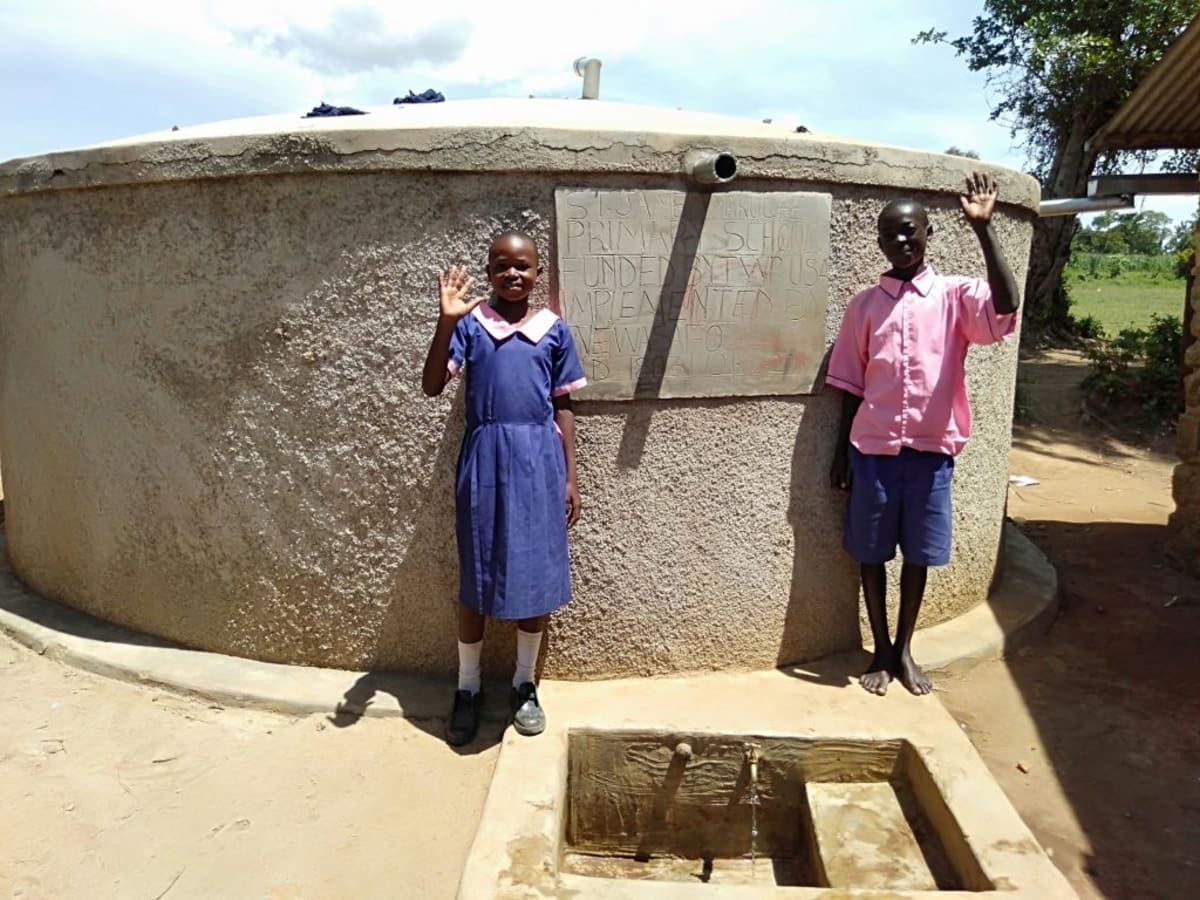It's 6am in the morning as Jane gets up to prepare for the school day. The first thing that crosses her mind is how she'll have to carry a heavy container of water to school with her, and how tiring that is. She washes her face, takes breakfast and balances her backpack in one hand and a water container in the other as she dashes out 30 minutes later.
Jane stops at Tindi Water Spring to fetch water. There, she washes her container, fills it with water, and dashes the rest of the way to school. As she approaches the gate the teacher on duty checks if each student has water. Those who have water take it to the kitchen and pour it in a 200-liter container. Those who have no water are given water containers to go back out and fill them.
At break time between classes, another group of students is sent to get more water for cooking, since the school has a feeding program for classes seven and eight, the preschool, and teachers.
Makuchi Primary currently has a student enrollment of 545 and employs 14 teachers and two support staff. (Editor's Note: While this many people may have access on any given day, realistically a single water source can only support a population of 350-500 people. To learn more about how we determine the number of people served, click here.)
Water
"The greatest challenge has been access to safe and clean drinking water. The parents bought us a 5,000-liter plastic water tank but due to the demand, it's not sufficient to serve the whole school effectively without recharging," Joseph Mwenesi, the deputy headteacher in this school, said.
"As a result, we have to ask pupils to carry water form home as they come, and in between the lessons we are also forced to send them to Tindi Water Spring for more water," he continued.
"We fear sending them, and at times they have to be escorted by a teacher for fear of being knocked down as they cross the busy road. Cases of absenteeism are very high and we think it's because of lack of safe water."
Tindi Spring is 1.5 kilometers away from the school. At the time of our first visit, Tindi Spring was open to pollution and entirely unsafe for drinking. Students were dipping their containers directly into the water, and would pause to rinse their hands and faces. Thankfully, this spring has been proposed for protection this year as well.
Students are constantly battling waterborne diseases because of the dirty water they find. School administration reports that there are five to seven absences per week. Beyond that, all students are wasting valuable study time as they're out in the community searching for the water they need.
Sanitation
"In this school, we have no plan for cleaning our classrooms and toilets due to lack of sufficient water. Our toilets are in a very bad state and they smell," Jane, a student at the school, said.
"Most pupils opt to use behind the classrooms and toilets, thus making our compound dirty and quite unhygienic. Our toilet doors don't close, so even strangers use them. We have no hand-washing stations and even if we had, there is no water for washing hands. With this project coming to this school, we shall surely have a clean and safe environment for studying."
The boys' latrines are made of timber walls and floors. The floors look soggy with urine all over. While the girls' latrines are made of concrete, they are still falling apart and the pits are almost full. All of these latrines are filthy. Traces of open defecation were found behind classrooms and latrines due to overuse of the current facilities. There's nowhere to wash hands before going back to class either.
Here's what we're going to do about it:
Training
Training will be held for two days. The facilitator will use PHAST (participatory hygiene and sanitation transformation), ABCD (asset-based community development), CTC (child to child), lectures, group discussions, and handouts to teach health topics and ways to promote good practices within the school. The CTC method will prepare students to lead other students into healthy habits, as well as kickstart a CTC club for the school.
Hand-Washing Stations
This CTC club will oversee the new facilities, such as hand-washing stations, and make sure they are kept clean and in working condition. The two hand-washing stations will be delivered to the school, and the club will fill them with water on a daily basis and make sure there is always a cleaning agent such as soap or ash.
VIP Latrines
Two triple-door latrines will be constructed with local materials that the school will help gather. And with a new source of water on school grounds, students and staff should have enough to keep these new latrines clean.
Rainwater Catchment Tank
A 50,000-liter rainwater catchment tank will help alleviate the water crisis at this school. The school will also help gather the needed materials such as sand, rocks, and water from the spring for mixing cement. Once finished, this tank can begin catching rainfall that will be used by the school’s students and staff.
We and the school strongly believe that with this assistance, standards will significantly improve. These higher standards will translate to better academic performance!
This project is a part of our shared program with Western Water And Sanitation Forum (WEWASAFO). Our team is pleased to provide the reports for this project (edited for readability) thanks to the hard work of our friends in Kenya.

 Rainwater Catchment
Rainwater Catchment
 Rehabilitation Project
Rehabilitation Project

































